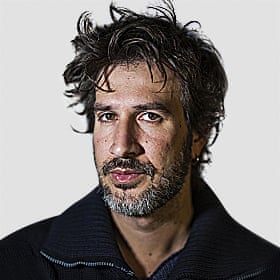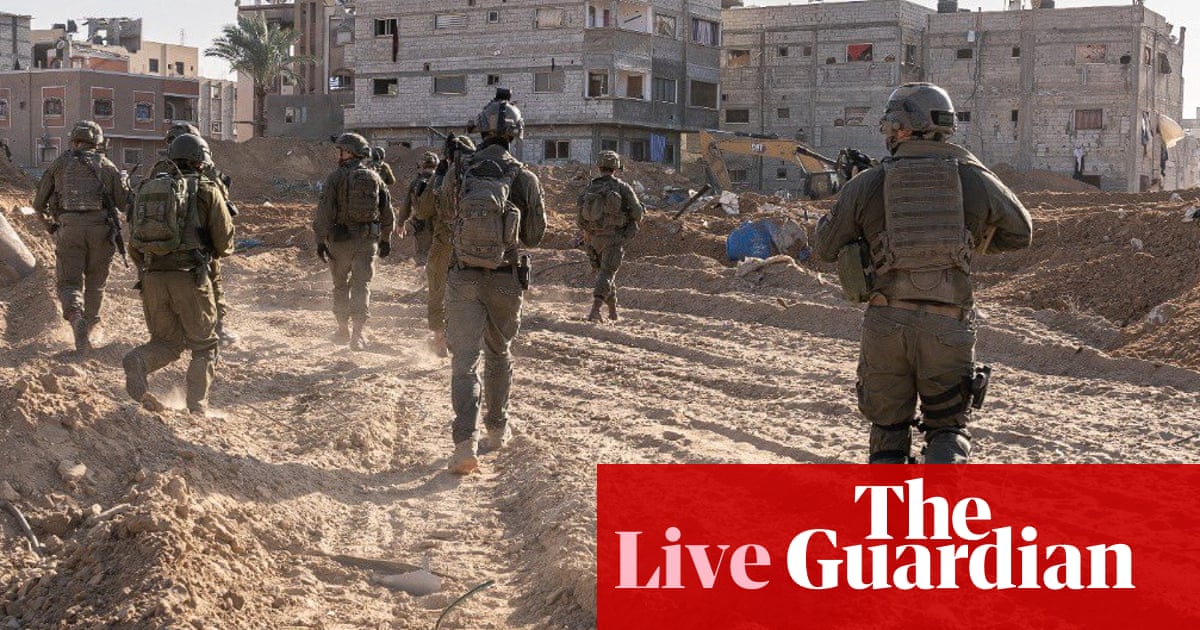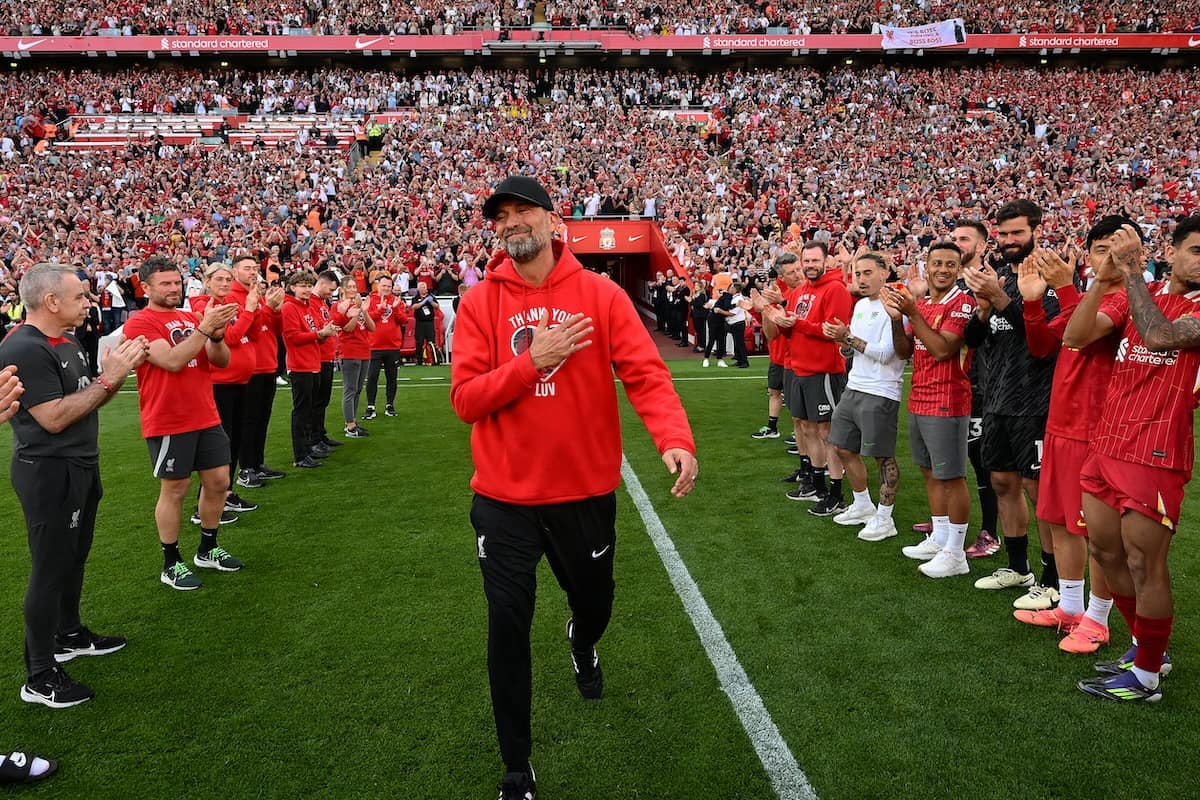Israeli whistleblowers claim abuse of Palestinians at detention centre
Lorenzo Tondo
Three Israeli whistleblowers working at the Sde Teiman desert camp, a holding site for Palestinians detained during Israel’s invasion of Gaza, have claimed to have witnessed a series of abuses by the military, including prisoners being restrained, blindfolded, and forced to wear diapers, reports CNN.
The Israeli whistleblowers said of the prisoners:
We were told they were not allowed to move. They should sit upright. They’re not allowed to talk. Not allowed to peek under their blindfold.
According to the sources, guards were instructed to enforce silence by shouting “uskot” (Arabic for “shut up”) and to identify and punish problematic individuals.
The witnesses told CNN the facility, some 18 miles from the Gaza frontier, is split into two parts: enclosures where around 70 Palestinian detainees from Gaza are placed under extreme physical restraint, and a field hospital “where injured detainees are immobilised, diapered, and fed through straws”.
According to the whistleblowers, the beatings were retaliatory in nature and not intended for intelligence gathering. “They were done out of revenge. It was punishment for what they [Hamas] did on October 7 and punishment for behaviour in the camp.”
One whistleblower described “a routine search when the guards would unleash large dogs on sleeping detainees, lobbing a sound grenade at the enclosure as troops barged in”.
Following the attack on Israel by Hamas on October 7, the Israeli military converted three military sites into detention camps for Palestinian prisoners from Gaza. This move aligns with Israel’s Unlawful Combatants Law, which was expanded by the Knesset in December to grant the military greater detention powers.
Responding to CNN’s request for comment on all the allegations, the Israeli military, said in a statement:
The IDF ensures proper conduct towards the detainees in custody. Any allegation of misconduct by IDF soldiers is examined and dealt with accordingly. In appropriate cases, MPCID (Military Police Criminal Investigation’s Division) investigations are opened when there is suspicion of misconduct justifying such action.
Detainees are handcuffed based on their risk level and health status. Incidents of unlawful handcuffing are not known to the authorities.
Key events
The United Nations has resumed the 10th emergency special session on the ongoing crisis in Gaza.
President of the general assembly Dennis Francis gavelled in the session, which was previously adjourned.
The latest special session comes as Israel prepares to launch a major military assault on the southern Gaza city of Rafah. The US, UN and humanitarian agencies have warned that such a move would cause a humanitarian disaster in the region.
Afternoon summary
-
Three Israeli whistleblowers working at the Sde Teiman desert camp, a holding site for Palestinians detained during Israel’s invasion of Gaza, have claimed to have witnessed a series of abuses by the military, including prisoners being restrained, blindfolded, and forced to wear diapers, reports CNN. The Israeli whistleblowers said of the prisoners: “We were told they were not allowed to move. They should sit upright. They’re not allowed to talk. Not allowed to peek under their blindfold.” According to the sources, guards were instructed to enforce silence by shouting “uskot” (Arabic for “shut up”) and to identify and punish problematic individuals.
-
Dwindling food and fuel stocks could force aid operations to grind to a halt within days in Gaza as vital crossings remain shut, forcing hospitals to close down and leading to more malnutrition, United Nations aid agencies warned on Friday. Humanitarian workers have sounded the alarm this week over the closure of the Rafah and Kerem Shalom crossings for aid and people as part of Israel’s military operation in Rafah, where around 1 million uprooted people have been sheltering, Reuters reported.
-
About 110,000 people have fled Rafah in southern Gaza and food and fuel supplies in the area are critically low, a United Nations official said. All crossings into southern Gaza remain closed, cutting off supplies and preventing medical evacuations and the movement of humanitarian staff, said Georgios Petropoulos, an official for the UN’s Office for the Coordination of Humanitarian Affairs working in Rafah.
-
An Israeli drone strike on a southern Lebanese village killed a paramedic and an employee of a telecommunications company on Friday as military activities have increased along the frontier in recent days. State-run National News said the paramedic and the technician died in the drone strike on Teir Harafa, about three kilometres (two miles) from the border with Israel, AP reported.
-
US Secretary of State Antony Blinken is expected to submit a highly critical report to Congress as soon as Friday on Israel’s conduct in Gaza that stops short of concluding it has violated the terms for its use of US weapons, Axios said. The report, citing three officials, added that the State Department was reviewing the use of weapons by Israel and six other countries engaged in different armed conflicts.
-
Dozens of women gathered at Tzahal Square in East Jerusalem on Friday for a silent sit-in, calling on the Israeli government to halt hostilities in Gaza and end the war. Dressed in white, they held banners with messages of ‘humanity’, ‘peace’ and ‘compassion’, as well as ‘stop the bloodshed’ – a poignant reminder of the toll of conflict.
-
The main United Nations aid agency for Palestinians closed its headquarters in East Jerusalem after local Israeli residents set fire to areas at the edge of the sprawling compound, the agency said. Philippe Lazzarini, the head of UNWRA, said in a post on the social media platform X that he had decided to close the compound until proper security was restored, Reuters reported. He said Thursday’s incident was the second in less than a week.
-
Spain, Ireland and other European Union member countries plan to recognise a Palestinian state on 21 May, the EU’s foreign policy chief, Josep Borrell, said late on Thursday ahead of an expected UN vote on Friday on a Palestinian bid to become a full member. Spanish prime minister Pedro Sanchez said in March that Spain and Ireland, along with Slovenia and Malta, had agreed to take the first steps towards recognition of a Palestinian state alongside Israel, seeing a two-state solution as essential for lasting peace.
-
Australia appears likely to support a UN vote on Palestinian membership after the draft resolution was significantly watered down in last-minute negotiations. The Australian government is continuing to consult on the matter ahead of a critical vote in the UN general assembly in New York, but the changes to the wording have allayed some of its earlier concerns.
-
Human Rights Watch has called on the German government to provide a public explanation for issuing a Schengen-wide ban on a prominent London surgeon who has provided testimony on the ongoing war in Gaza, as he is blocked from entering the Netherlands later this month. Last week, Prof Ghassan Abu-Sitta told the Guardian he felt criminalised after being denied entry to France over the weekend, where the plastic and reconstructive surgeon was due to speak about the war to the French parliament’s upper house.
-
On a visit to Washington, German defence minister Boris Pistorius expressed “understanding” for the US threat to limit arms supplies to Israel in the event of a full-blown Rafah offensive but stopped short of setting any new red lines on German weapons. However, he told ZDF public television that Germany must put pressure on Israel “not to go too far” and to “slow down” in its military response to the 7 October attacks.”
-
The United Kingdom Maritime Trade Operations (UKMTO) organisation said on Friday it had received a report of a failed hijacking attempt of a vessel 195 nautical miles east of Yemen’s Aden. The vessel’s master reported being approached by a small craft carrying five or six armed people with ladders.
-
Benjamin Netanyahu has vowed that Israel will stand alone and “fight with our fingernails” in defiance of US threats to further restrict arms deliveries if Israeli forces proceed with an offensive on the southern Gaza city of Rafah. Netanyahu, the Israeli prime minister, was speaking on Thursday after Israeli and Hamas delegations left the ceasefire negotiations in Cairo. It was unclear whether the talks had broken down or simply paused. Hamas said early on Friday that the “ball is now completely” in Israel’s hands, while Israel has claimed that Hamas’ version of a deal fell far short of its requirements.
-
Egypt has said Hamas and Israel must show “flexibility” if they are to strike a deal for a ceasefire and hostage-prisoner exchange , according to a foreign ministry statement released Friday. The readout of a phone call between Egyptian Foreign Minister Sameh Shoukry and US secretary of state Antony Blinken said both diplomats agreed on “the importance of urging the parties to show flexibility and make all the necessary efforts to achieve a ceasefire agreement and put an end to the humanitarian tragedy in Gaza”.
-
Hamas said early Friday that its delegation attending Gaza ceasefire negotiations in Cairo had left the city for Qatar, adding the “ball is now completely” in Israel’s hands. “The negotiating delegation left Cairo heading to Doha. In practice, the occupation [Israel] rejected the proposal submitted by the mediators and raised objections to it on several central issues,” the group said in a message to other Palestinian factions, according to Agence France-Presse.

Lorenzo Tondo
Dozens of women gathered at Tzahal Square in East Jerusalem on Friday for a silent sit-in, calling on the Israeli government to halt hostilities in Gaza and end the war.
Dressed in white, they held banners with messages of ‘humanity’, ‘peace’ and ‘compassion’, as well as ‘stop the bloodshed’ – a poignant reminder of the toll of conflict.
“We are trying to remind people that there is an alternative,” says Amit, a member of the organisation Women Peace Sit-In. “For too long, the discourse in Israel has been one-sided, culminating in the present extreme violence and militarism. We advocate for a path to peace and coexistence.”
“Regrettably,” she adds, “we find ourselves a minority within a minority.’’
“We are all human beings and we deserve the same rights, freedom of movement and food security’’, says Lena. “We heard words the like deal and ceasefire, but the word peace has completely disappeared from the discourse. We stand firm in the belief that peace is attainable and halting the bloodshed is imperative.”
After Israel vowed to enter the southern Gaza city and flush out Hamas forces, the country has faced increasing pressure as the operation could derail fragile humanitarian efforts in Gaza and endanger many more lives.
Anti-war movements, pacifists and families of hostages are mobilising nationwide, with thousands in recent days taking to the streets of Jerusalem and Tel Aviv to voice their dissent.
An Israeli drone strike on a southern Lebanese village killed a paramedic and an employee of a telecommunications company on Friday as military activities have increased along the frontier in recent days.
State-run National News said the paramedic and the technician died in the drone strike on Teir Harafa, about three kilometres (two miles) from the border with Israel, AP reported.
The Islamic Risala Scout Association paramedic group said one of its members, Ghaleb Hussein al-Haj, was killed while performing his duties in south Lebanon. The group is the paramedic arm of the Amal group of parliament speaker Nabih Berri.
The strike came a day after a similar attack on a car in a southern Lebanese village killed four members of the militant Hezbollah group.
About 110,000 people flee Rafah, says UN
About 110,000 people have fled Rafah in southern Gaza and food and fuel supplies in the area are critically low, a United Nations official said.
All crossings into southern Gaza remain closed, cutting off supplies and preventing medical evacuations and the movement of humanitarian staff, said Georgios Petropoulos, an official for the UN’s Office for the Coordination of Humanitarian Affairs working in Rafah.
An official for the UN’s Office for the Coordination of Humanitarian Affairs working in Rafah says all crossings into southern Gaza remain closed, cutting off supplies and preventing medical evacuations and the movement of humanitarian staff.
Around 1.3 million Palestinians — over half Gaza’s population — had sought refuge in Rafah.
Israeli prime minister Benjamin Netanyahu said on Thursday that a US threat to withhold some weapons would not deter Israel from expanding its offensive in Gaza.
A limited Israeli operation earlier this week captured the Gaza side of Rafah’s border crossing with Egypt, throwing humanitarian operations into crisis, Reuters reported.
Israeli whistleblowers claim abuse of Palestinians at detention centre

Lorenzo Tondo
Three Israeli whistleblowers working at the Sde Teiman desert camp, a holding site for Palestinians detained during Israel’s invasion of Gaza, have claimed to have witnessed a series of abuses by the military, including prisoners being restrained, blindfolded, and forced to wear diapers, reports CNN.
The Israeli whistleblowers said of the prisoners:
We were told they were not allowed to move. They should sit upright. They’re not allowed to talk. Not allowed to peek under their blindfold.
According to the sources, guards were instructed to enforce silence by shouting “uskot” (Arabic for “shut up”) and to identify and punish problematic individuals.
The witnesses told CNN the facility, some 18 miles from the Gaza frontier, is split into two parts: enclosures where around 70 Palestinian detainees from Gaza are placed under extreme physical restraint, and a field hospital “where injured detainees are immobilised, diapered, and fed through straws”.
According to the whistleblowers, the beatings were retaliatory in nature and not intended for intelligence gathering. “They were done out of revenge. It was punishment for what they [Hamas] did on October 7 and punishment for behaviour in the camp.”
One whistleblower described “a routine search when the guards would unleash large dogs on sleeping detainees, lobbing a sound grenade at the enclosure as troops barged in”.
Following the attack on Israel by Hamas on October 7, the Israeli military converted three military sites into detention camps for Palestinian prisoners from Gaza. This move aligns with Israel’s Unlawful Combatants Law, which was expanded by the Knesset in December to grant the military greater detention powers.
Responding to CNN’s request for comment on all the allegations, the Israeli military, said in a statement:
The IDF ensures proper conduct towards the detainees in custody. Any allegation of misconduct by IDF soldiers is examined and dealt with accordingly. In appropriate cases, MPCID (Military Police Criminal Investigation’s Division) investigations are opened when there is suspicion of misconduct justifying such action.
Detainees are handcuffed based on their risk level and health status. Incidents of unlawful handcuffing are not known to the authorities.
Police dismantled a pro-Palestinian tent encampment at the Massachusetts Institute of Technology (MIT) early on Friday and moved to clear protesters from the University of Pennsylvania’s campus in Philadelphia, just hours after police tear-gassed protesters and took down an encampment at the University of Arizona, Reuters reported.
Video showed police roaming through the MIT encampment and organisers said about 10 students had been detained. Police in riot gear arrived around 4 am encircled the camp and gave protesters about 15 minutes to leave. A crowd outside the camp began gathering and chanting pro-Palestinian slogans but were dispersed by 6 am.
Quinn Perian, an undergraduate student at MIT and organiser for MIT Jews for Ceasefire, said: “This is only going to make us stronger. They can’t arrest the movement.
“We are going to continue and won’t back down until MIT agrees to cut ties with the Israeli military. MIT would rather arrest and suspend some students than they would end their complicity with the genocide going in Gaza.”
Before removing the encampment, MIT earlier in the week had started suspending dozens of students involved in the encampment, meaning they wouldn’t be able to take part in academic activities nor commencement.
MIT President Sally Kornbluth, had previously said: “This prolonged use of MIT property as a venue for protest, without permission, especially on an issue with such sharp disagreement, is no longer safely sustainable.”
In Philadelphia early on Friday, police detained people who were at an encampment that has been in place at the University of Pennsylvania’s campus for more than two weeks. Officers moved in after giving pro-Palestinian protesters a warning to leave campus or face possible arrest.
Tensions have ratcheted up in standoffs with protesters on campuses across the United States and increasingly in Europe.
Nearly all Gaza campus protests in the US have been peaceful, study finds

Lois Beckett
An independent non-profit that tracks political violence and political protests around the world found that 97% of campus demonstrations over the war in Gaza that have taken place in the US since mid-April have been peaceful.
An analysis of 553 US campus demonstrations nationwide between 18 April and 3 May found that fewer than 20 resulted in any serious interpersonal violence or property damage, according to statistics from the Armed Conflict Location and Event Data project (Acled).
Over the same period, Acled documented at least 70 instances of forceful police intervention against US campus protests, which includes the arrest of demonstrators and the use of physical dispersal tactics, including chemical agents, batons and other kinds of physical force.
Nearly half of the campus protests that Acled categorized as violent involved protesters fighting with law enforcement during a police intervention, according to the group’s data.
Protest encampments in solidarity with Gaza have popped up on college campuses across the US since April, with students voicing a variety of demands, including calls on universities to publicly support a ceasefire in Gaza, divest from Israeli companies and companies that supply Israel’s military, and end ties with Israeli universities. The protests have inspired similar actions across the UK and Europe, as well as in India and Lebanon.
Since 18 April, when 108 students were arrested at Columbia University, the administrators of many schools have called in law enforcement to forcibly remove the encampments, resulting in more than 2,600 arrests across more than 50 US campuses, according to an ongoing tally by the Associated Press.
You can read the full report here.

Geneva Abdul
Human Rights Watch has called on the German government to provide a public explanation for issuing a Schengen-wide ban on a prominent London surgeon who has provided testimony on the ongoing war in Gaza, as he is blocked from entering the Netherlands later this month.
Last week, Prof Ghassan Abu-Sitta told the Guardian he felt criminalised after being denied entry to France over the weekend, where the plastic and reconstructive surgeon was due to speak about the war to the French parliament’s upper house.
“Germany should immediately explain why it has denied him entry and imposed this far-reaching ban on a leading health professional to speak in Berlin, Paris, and The Hague about what he witnessed in Gaza,” said Yasmine Ahmed, UK Director at Human Rights Watch (HRW) on Friday.
During October and November 2023, at the beginning of Israel’s war in Gaza, which has since killed more than 34,000 Palestinians, Abu-Sitta operated from al-Shifa and al-Ahli hospitals. During his 43 days, he described witnessing a “massacre unfold” in Gaza and the use of white phosphorus munitions, which Israel has denied.
Abu-Sitta has since provided evidence to Scotland Yard and the international criminal court (ICC) in The Hague. He intends to challenge his entry ban in the German courts and is considering going to the European court of human rights.
The Palestinian ambassador has invited Sitta to attend an event in the Hague on the 76th anniversary of Nakba Day on 15 May. However, Sitta told HRW that Dutch officials informed the Palestinian ambassador to the Netherlands that he would not be permitted to enter for the event.
However, Sitta was told he would be considered for entry for a meeting with the Hague-based Organization for the Prohibition of Chemical Weapons (OPCW), where Sitta plans to brief the director general on the use of white phosphorus by Israeli forces, which Israel has denied using. Entry for the meeting would be permitted, Sitta was told, on the condition that he leaves immediately after.
In April, Abu-Sitta travelled to Berlin to participate in the Palestine Congress forum, where he was denied entry by authorities because they “could not ensure the safety of attendees in the conference”, he said. The Guardian previously approached the German federal police for comment.
Human Rights Watch wrote to the German government on April 24 asking for an explanation in line with the country’s obligations to freedom of expression, assembly and nondiscrimination. The organisation did not receive a response and has also called on the UK and Scottish governments to apply pressure on the German government, explaining the legality of the Schengen-wide visa ban.
“In the midst of ongoing atrocities in Gaza, countries should be prioritizing ending complicity and promoting accountability,” Ahmed said. “Instead, Germany, in blocking Dr. Abu Sittah from sharing his experience, is trying to block citizens from even hearing about the grave abuses taking place in Gaza. The UK government should immediately raise the reported ban with their German counterparts.”
Gaza aid could grind to a halt within days, UN agencies warn
Dwindling food and fuel stocks could force aid operations to grind to a halt within days in Gaza as vital crossings remain shut, forcing hospitals to close down and leading to more malnutrition, United Nations aid agencies warned on Friday.
Humanitarian workers have sounded the alarm this week over the closure of the Rafah and Kerem Shalom crossings for aid and people as part of Israel’s military operation in Rafah, where around 1 million uprooted people have been sheltering, Reuters reported.
The Israeli military said a limited operation in Rafah was meant to kill fighters and dismantle infrastructure used by Hamas, which governs the besieged Palestinian territory.
“For five days, no fuel and virtually no humanitarian aid entered the Gaza Strip, and we are scraping the bottom of the barrel,” said the Unicef senior emergency coordinator in the Gaza strip, Hamish Young.
“This is already a huge issue for the population and for all humanitarian actors but in a matter of days, if not corrected, the lack of fuel could grind humanitarian operations to a halt,” he told a virtual briefing.

Daniel Hurst
Australia appears likely to support a UN vote on Palestinian membership after the draft resolution was significantly watered down in last-minute negotiations.
The Australian government is continuing to consult on the matter ahead of a critical vote in the UN general assembly in New York, but the changes to the wording have allayed some of its earlier concerns.
Sources familiar with the negotiations said the new wording would see some countries that were likely to vote “no” shift to an abstain position, and some countries that were likely to abstain move into the “yes” column.

Emily Foster is a globe-trotting journalist based in the UK. Her articles offer readers a global perspective on international events, exploring complex geopolitical issues and providing a nuanced view of the world’s most pressing challenges.








